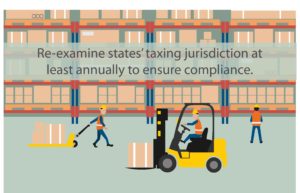Amazon to Release Vendors’ Names, Per Order of Massachusetts DOR
 When purchasing items from Amazon, buyers may see a designation of “Sold by Amazon,” or “Sold by XYZ Co and Fulfilled by Amazon,” without paying significant attention to the difference. For vendors, the distinction is important.
When purchasing items from Amazon, buyers may see a designation of “Sold by Amazon,” or “Sold by XYZ Co and Fulfilled by Amazon,” without paying significant attention to the difference. For vendors, the distinction is important.
Sellers who participate in the Fulfilled by Amazon (“FBA”) program retain ownership of their goods, essentially hiring Amazon to warehouse and sell their goods for them. Once in the FBA program, Amazon takes possession of the goods and moves them to their various warehouse locations as they see best, likely for the purposes of shortening delivery times, especially for Amazon Prime members.
This has created a problem for state revenue departments, as ownership of goods in a state often creates nexus for either or both (depending on the state) sales tax and corporate income tax purposes.
Massachusetts, which has been very aggressive with respect to internet sales, has ordered Amazon to provide the names and identifying data of vendors participating in the FBA program whose goods are stored in Amazon’s Massachusetts warehouses. Amazon announced this week that they will comply with this order on January 26.
The ultimate impact of this milestone court order is uncertain. The outcomes range from the Massachusetts DOR pursuing vendors for back taxes on an individualized basis, to their requiring Amazon to collect Massachusetts sales tax on FBA sales to Massachusetts purchasers (which Amazon already does for items sold from its own inventory). Depending on Massachusetts’ success with this initiative, other states could follow suit with their own programs.
AAFCPAs advises Massachusetts-based clients participating in the FBA program, as well as clients based elsewhere who are already collecting Massachusetts sales tax, to verify that tax on sales made through the FBA program have been collected and remitted to the state. This can occur via arrangements made with Amazon, or via direct filing with the Massachusetts DOR. Vendors who sell through multiple channels often elect to file directly in order to capture all taxes via a single filing.
AAFCPAs reminds clients that State and Local Tax (or multistate taxation) is more complex and demanding than ever before. We advise that clients and friends of the firm closely re-examine states’ taxing jurisdiction at least annually to ensure compliance with all relevant tax regulations, and to optimize tax savings.
If you have any questions please contact your AAFCPAs partner, or Richard Weiner, CPA, MST at 774.512.4078, rweiner@nullaafcpa.com.

